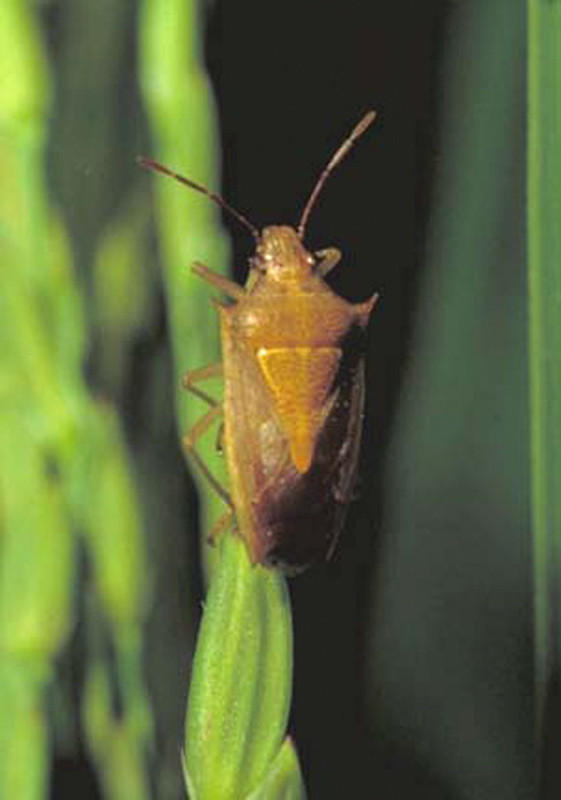Arkansas gains use of Endigo ZC to battle rice stinkbugs
The EPA has granted a Section 18 exemption to allow Arkansas rice growers to protect their crop from another pest being seen in large numbers: Rice stinkbugs
Aug. 16, 2021
By Mary Hightower
U of A System Division of Agriculture
Fast facts
- Section 18 granted Aug. 13 is good for 15 days
- Entomologists will seek extension to end of season
(327 words)
(Newsrooms: with file art here: https://flic.kr/p/a5JB2g
ROE, Ark. — Arkansas rice growers battling yet another insect in their crops have until Aug. 28 to use Endigo ZC, after the Environmental Protection Agency issued a Section 18 exemption on Aug. 13.
Endigo is currently labeled for use in soybeans, cotton and some specialty crops, but not rice. The exemption will enable rice growers in Arkansas to use the tool to manage rice stinkbugs.

These stinkbugs can cause yield loss by feeding on kernels and can also damage kernels by allowing pathogens to enter the grain and cause discoloration which can reduce milling quality and grade.
Many growers have seen rice stinkbug numbers at threshold for treatment or above for four weeks or more, said Nick Bateman, extension entomologist for the Division of Agriculture.
Last month, University of Arkansas System Division of Agriculture entomologists sought and received a similar exemption for Intrepid to help rice growers manage fall armyworms, which appeared in high numbers to devour the tender leaves in Arkansas rice fields.
With the rice stinkbugs, “there’s been a severe lack of control in the last month and a half with lambda cyhalothrin,” Bateman said. “We ran some tests last week and saw between 26 and 61 percent control at Altheimer. At Switfon, in northeast Arkansas, we saw between 23 and 70 percent control.
“We are used to seeing 85-90 percent control with lambda cy,” he said.
Extension entomologist Gus Lorenz said “we picked this product for a Section 18 because it had been granted before in Texas. We knew EPA had all the information to move forward with it. We had a conference call with EPA last week and they decided to give us 15 days with this product.”
“We will try to get it extended through the end of the season,” Lorenz said.
Bateman said application rates of 4.5 ounces to 5 ounces per acre have been effective. “Our data is solid on that,” Lorenz said.
Late-planted rice
Even though rice harvest has begun for some, many rice growers had to replant because
of severe flooding in June.
“We’re concerned about all the late rice replanted due to the floods,” Lorenz said. “We’ve still got a lot of rice yet to head.”
Lorenz urged growers to “go to the State Plant Board website to download the Section 18 and adhere to the label that’s there. If you make applications, you need to file that the with State Plant Board within 10 days of application.”
Use of product names does not imply endorsement.
To learn about extension programs in Arkansas, contact your local Cooperative Extension Service agent or visit www.uaex.uada.edu. Follow us on Twitter and Instagram at @AR_Extension. To learn more about Division of Agriculture research, visit the Arkansas Agricultural Experiment Station website: aaes.uada.edu. Follow on Twitter at @ArkAgResearch. To learn more about the Division of Agriculture, visit https://uada.edu/. Follow us on Twitter at @AgInArk.
About the Division of Agriculture
The University of Arkansas System Division of Agriculture’s mission is to strengthen
agriculture, communities, and families by connecting trusted research to the adoption
of best practices. Through the Agricultural Experiment Station and the Cooperative
Extension Service, the Division of Agriculture conducts research and extension work
within the nation’s historic land grant education system.
The Division of Agriculture is one of 20 entities within the University of Arkansas System. It has offices in all 75 counties in Arkansas and faculty on five system campuses.
Pursuant to 7 CFR § 15.3, the University of Arkansas System Division of Agriculture offers all its Extension and Research programs and services (including employment) without regard to race, color, sex, national origin, religion, age, disability, marital or veteran status, genetic information, sexual preference, pregnancy or any other legally protected status, and is an equal opportunity institution.
# # #
Media contact: Mary Hightower